1) Hey Mike, welcome to this Muscle Gain Truth Inner Circle interview. How are things?
Doing great Sean, excited to talk shop with you.
2) You’re the creator of the well known “Critical Bench” program which teaches readers how to dramatically increase their bench pressing strength in the shortest period of time possible. Why do you think it is that the bench press has become such a landmark for measuring strength?
Don’t get me started Sean. First things first. What’s the most common question people ask you when you tell them you run a muscle building site? Probably, “How Much Do Ya Bench?” Why do they ask this? It’s an extremely popular well known exercise and for a reason. People don’t realize this but it’s literally a full body exercise. When performed correctly your legs will be sore, your lats will be sore, not to mention your chest, shoulders and triceps. It’s a great mass builder and carries over to a lot of field sports as well. I’m biased I’m the founder of CriticalBench.com but if I could only train one exercise the bench press would be it. Followed a close second and third by the deadlift and squat. Multi-joint free weight compound movements are always the best muscle builders.
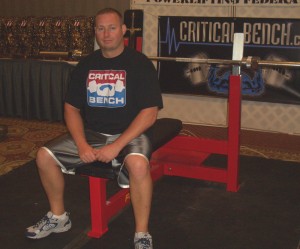
3) Were you always naturally strong on the bench press? What kind of weight are you capable of moving now?
As a kid I was really skinny. In fact my freshman year of high school I weighed 120 pounds and couldn’t even bench press my own weight. Even when you stick up for yourself it seems that the smallest people always seem to be the ones that get picked on the most and have to constantly defend themselves. Like so many others I got myself a cheap Weider weight bench with the plastic weights and started lifting in my basement while practicing my punches on a heavy bag. Things were progressing slowly, but I was hooked on the muscle mags and reading everything I could get my hands on.
My family moved to CT my sophomore year of high school. Not having a ton of friends I spent a lot of my time in the YMCA weight room. In fact I probably spent way too much time there. I’m sure I was overtraining doing a full body workout 5-7 days a week, but as a beginner I was still making gains. I had to gain weight so I wouldn’t get pushed around the football field as defensive back, so I kept at it. By my senior year of high school I weighed 185 pounds and benched 275. Nothing amazing, but it was a huge improvement for me.
My lifting workout had been improving the more I read, I was eating as much as I could and training a lot smarter. I still wasn’t training the right way to add serious muscle but I was doing alright. After high school I walked onto a D-IAA football team and became a starter by my junior year. The summer of my sophomore year I figured out with the help of one of the team captains that you get stronger and put on size by doing heavy compound movements for low reps. When I dropped my reps and increased the weight my bench soared from a 315 to 400+ in a matter of a year.
Post college I kept at it reaching a 450 raw bench. I decided it was time to start competing. After moving to Florida and joining a barbell club I started competing in powerlifting. I compete in equipped powerlifting using a bench shirt I pressed 622 this past December. A week after the meet I benched 315 for 15 reps in the gym. I’m always trying to improve.
315 for 15
http://www.youtube.com/watch?v=YmWAXwgx8Xk
630 Equipped Bench
http://www.youtube.com/watch?v=Bhxd15mWCuM
4) Surely there are individual differences, but as a general guideline, how fast can a trainee expect to increase his or her bench pressing strength when using the right program?
Sean I love this question. The reason is it’s entirely up to the person that’s trying to increase their bench press. If you’re the kind of person that thinks 50 pounds in 10 weeks is impossible than you’re completely right, you’ll never accomplish it. Likewise if you believe you can do it and have a good plan there’s no limit. I can’t set limits for people. This is one of my favorite quotes;
“If you can imagine it, you can achieve it. If you can dream it, you can become it.”
-William Arthur Ward
Based on results I’ve seen I would say if you bench press less than 400 pounds you can increase your bench press by 50 pounds in 2.5 months. After that you start reaching your genetic potential and the gains certainly start getting harder.
A complete beginner will improve the most. Just practicing the lift and learning the motor skills will allow the trainee to bench more even without getting much stronger.
In addition if you haven’t trained with heavier loads and lower reps before you’ll likely react very well to this kind of program. Your CNS has to adapt to the heavier weights for you to get stronger.
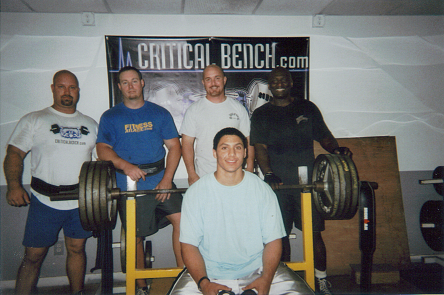
5) What are some of the most common mistakes that you see lifters making when training for strength on the bench press, and how can we correct them?
Mistake 1: Overtraining
Let your CNS and your muscles recover and strengthen before hitting the bench again. Once a week is enough when training the bench.
Mistake 2: Pre-fatigue
Don’t do shoulders or triceps before a bench workout. You’re exhausting the primary movers you are going to need to bench. Don’t do cardio before a heavy bench workout and don’t deplete all your energy by doing way too many warm up sets. Save your energy for the max effort sets!
Mistake 3: Self Doubt
Get your head on straight. Get rid of all this self doubt and negativity. Don’t start a set by saying you’re going to “Try” or you “Hope” you’re going to get this rep. Your subconscious mind listens to you so program it with positive encouraging visions rather than self destructing criticism.
If you’re not confident, fake it. You have to picture yourself as a great bencher before you can become one.
Mistake 4: Lack of Goals
Would you head out on a cross country trip without a road map? Goals need to be realistic, measurable and specific. Be accountable. Tell people what you’re going to do and how you’re going to do it. Remind yourself of your goals daily.
Mistake 5: Rep Ranges
High reps are not going to get you stronger in the bench press. Triples build power! If you’ve never done triples start with fives and work your way down over a few weeks.
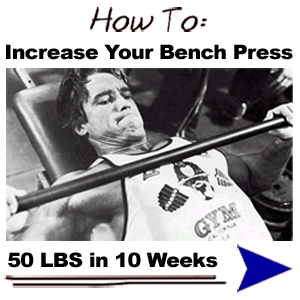 6) What is your opinion on the use of advanced techniques such as forced reps or heavy negatives? Is it necessary to employ these techniques on the bench?
6) What is your opinion on the use of advanced techniques such as forced reps or heavy negatives? Is it necessary to employ these techniques on the bench?
Forced reps are okay when used in moderation. You just don’t want to have your training partner getting a trap and bicep workout in when you’re benching. It’s good to grind out the weight but when you’re stuck you’re stuck.
As for heavy negatives bench presses, I do not recommend these for beginners. They may not have the tendon strength or the stabilizers to control a weight well over their max. In addition if you’re getting sore from the regular workouts you don’t want to push it with a movement that is almost entirely eccentric which we all know causes muscle soreness.
For an intermediate or advanced lifter heavy negatives can be a huge confidence booster. Having felt and controlled such heavy weight sure makes the weight feel lighter when you go back to your working sets. There’s a lot of people from the school of thought that think eccentric training is good for strength and muscle, so I think it’s a good tool to utilize sparingly from time to time. See how you respond to it but make sure you have three spotters in place.
7) What about those delicate rotator cuffs that are so prone to injury. How can we prevent injuries when trying to move such heavy weights?
When you bench press there are four tiny muscles that play a major role in whether your bench press takes off or if you’re going to suffer from a bench press blowout. Build these muscles up and you can dramatically decrease the chance of blowing out your shoulder. If you’re benching heavy weight and not paying attention to these muscles you run the risk of muscular imbalances, shoulder pain, and getting stuck in a serious plateau.
To avoid rotator cuff issues I recommend warming them up prior to a bench press workout by doing some very very very light external rotation exercises. You definitely do not want to fatigue these muscles prior to benching. Than on a different day at the end of your shoulder workout do 3 or 4 sets of 15 reps with a similar exercise. Some rotator cuff exercises you can incorporate include the Cuban press, and Cable Internal and External Rotation.

8 ) Can these same techniques be used as part of a bodybuilding program for the chest, or are they strictly geared at building strength?
Sean we may disagree here but I believe that when you lift heavy with compound movements you involve the most muscle groups, release more testosterone and growth hormone and produce bigger and stronger muscles. If you strongly believe that you need to 10 reps for muscular hypertrophy than do the heavy bench press workout first than move on to some assistance exercises using higher reps. This way you get the best of both worlds. Do you want to look strong? Or do you want to be strong? Or would you rather look and be strong? I’ll take the third.
9) Do you have any other additional advice for increasing bench pressing strength fast?
You can probably utilize these two tips immediately to see some gains.
Big Bench Tip #1: Shorten the distance the bar travels. Move your fingers out an inch or two on the bar. Squeeze your shoulder blades together and flare your lats to create a nice solid base to press from. Chest out, shoulders back. Now arch your back so that your traps and butt are in contact with the bench and your feet are planted on the floor. You should be able to fit a foam roller under your lower back. Combine these three techniques and you’ve reduced the path the bar travels by 6-inches or more which should give you a nice boost in the weight you can move. This is not cheating; it’s legal in a powerlifting meet. Stay tight!
Big Bench Tip #2: Hold your air. Instead of taking a big breathe as you lower the weight and exhale as you push I want you to hold your breathe from start to finish. Why? By doing this you will stabilize your torso and create a more solid base to press from. Holding your air will help you keep the pressure tight.
Thanks for the interview, Mike!
Anytime Sean, thanks again for having me. Anytime you want to talk about the bench press I’m you’re man.
If you’re looking to build muscle and increase your bench press at the same time than be sure to look into my Critical Bench Press Program 2.0. It’s a full body strength training program designed to up your max by 50 lbs in 10 weeks.
Sean Nalewanyj Interviews Mike “Westy” Westerdal

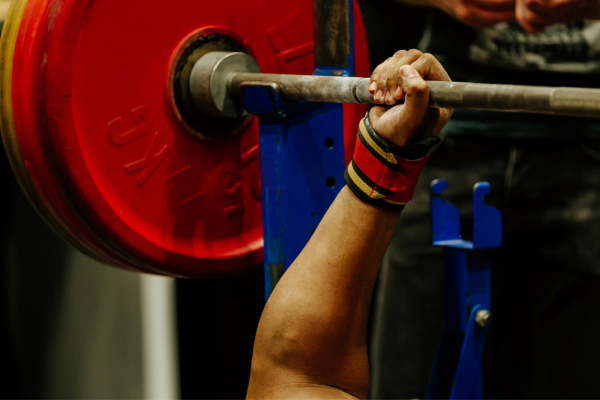




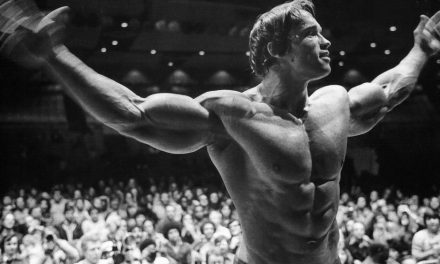











































































I have purchased the Critical Bench program and have been very impressed with it – enough to do a review on my site – http://www.quickmusclebuild.com/critical-bench-review/ It cuts to the point without the hype which is becoming rare it the muscle building world.
The interview touches on many good points to become a huge bench presser and many beginners do not know this information. Keep the info coming
thanks guys
Once a level is achieved like 420 or whatever it might be what do you recommend to “maintain” that strength if one doesn’t want to do the “add 50 lbs” course all the time? I have used the deload program in between add 50 lbs cycles and it works wonderful I just need long term maintenance.